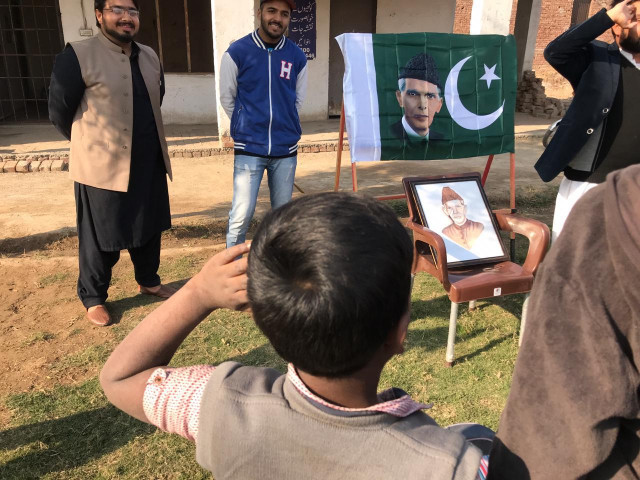It’s what you do with education that counts
In Faisalabad, two young men have decided to use their gifts to enlighten the most downtrodden children

PHOTO: EXPRESS
In Faisalabad, like other Pakistani cities, seeing children as young as five selling wares by the roadside or serving food and drinks or washing dishes in cafes is normal. While the previous government did initiate an education programme aimed at children from low income families under the slogan ‘Parho Punjab, Barho Punjab’ (Read Punjab, Rise Punjab), the initiative seems to have lost all steam. And although the current government too promises to uplift literacy, so far the picture appears far from optimistic.
As hopeless as the situation seems, two young men in Pakistan’s third most populous city have taken it upon themselves to do what they can to shine the light of education on some of the metropolis’ poorest corners.
Upon completing a BSc Honors degree in Mass Communication from GC University Faisalabad, Hasan Ashraf partnered with his friend Junaid Amin, a Computer Sciences student at the University of Central Punjab, to provide free education to children living in low income neighbourhoods. Starting with one school two years ago, the two with financial and material support from their other friends have now establish six free schools in different slum areas and labour residential colonies of Faisalabad.
“This is our attempt in our capacity to improve literacy in Pakistan,” Hasan told The Express Tribune. “We hope this will have some impact on efforts to stem unemployment.”
According to Hasan, over 300 students are enrolled in the schools set up in fully furnished rented facilities in the Ghulam Muhammadabad, Jaranwala Road, Bijli Ghar Kanal Road and Millat Chowk areas of Faisalabad, and at a location close to the GC University campus.
“The children are taught five days a week, mostly by undergraduate students from various universities,” said Hasan, adding that the students are provided free stationery and books as well. “Twelve teachers look after the affairs of the schools, most of whom undergraduate students who have volunteered for our cause. A few teachers are properly remunerated.”
“We teach students a syllabus updated to keep up with modern requirements,” said Tehmina Riaz, a senior teacher who works with and guide Hasan’s team on teaching strategies and curriculum. “School students are mostly taught in the evening as they have to work during the day,” she said.
A few students interviewed at the school revealed that they had keen interest in education and studies and wanted to grow up to be responsible and respected citizens.
This is not where Hasan and fellow volunteers plan to stop, however. They, he said, are now working towards establishing mobile schools to teach children living in far-flung areas.
“I am happy that so many of my friends and former classmates have supported our mission, either by volunteering or by funding us,” said Hasan. However, he urged the government to support his students once they finish receiving basic education at his school.
“The government should ensure these children can pursue higher education so they have the means to improve their lives and livelihood,” he said. I hope that the prime minister will take effective measures for education, especially for students coming from unprivileged backgrounds. It is usually due to poverty that the delicate hands of the children are used for labour at a time when they should be holding pencils and books.”



















COMMENTS
Comments are moderated and generally will be posted if they are on-topic and not abusive.
For more information, please see our Comments FAQ